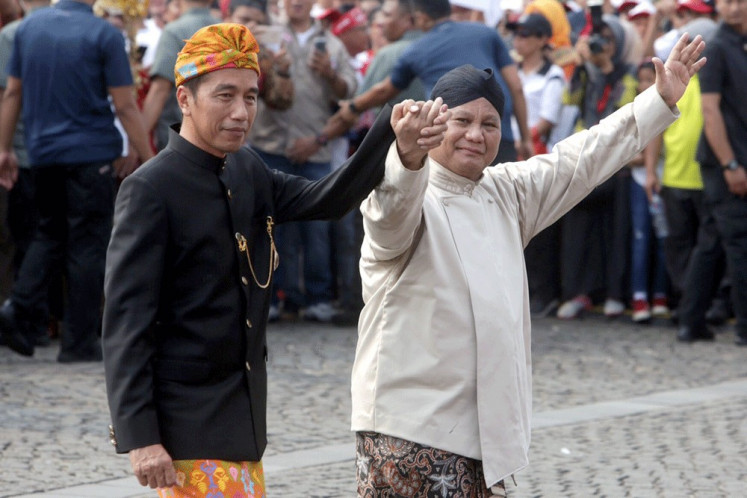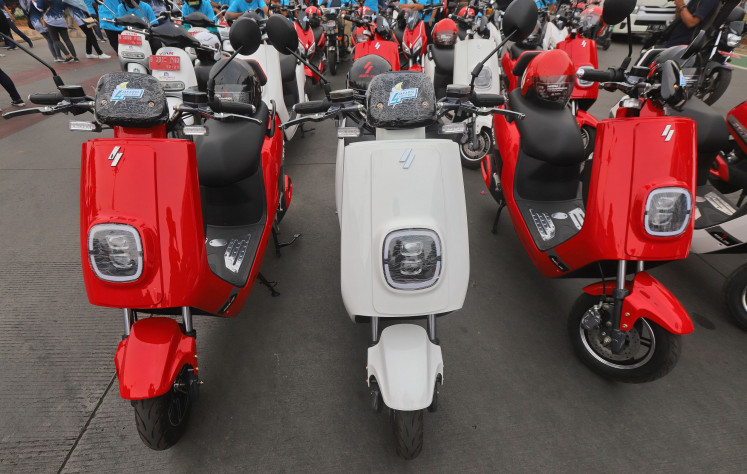Digitalization of MSMEs key to Southeast Asia’s economic recovery
Governments in several Southeast Asian economies, including Vietnam, Indonesia, Cambodia, Thailand, and the Philippines, have in recent years, enacted regulations that are likely to dampen innovation and erect barriers for local businesses, entrepreneurs and startups.
Change text size
Gift Premium Articles
to Anyone
 Information technology (IT) solution provider Weefer has launched Lark, an integrated platform that has various features to allow business collaboration with MSMEs. (Weefer/File).
Usage: 1 (Weefer/File)
Information technology (IT) solution provider Weefer has launched Lark, an integrated platform that has various features to allow business collaboration with MSMEs. (Weefer/File).
Usage: 1 (Weefer/File)
D
espite the extremely challenging environment in 2020, the momentum of Southeast Asia’s digital economy has clearly not been derailed.
Google, Temasek and Bain recently reported that Southeast Asians spent, on average, an hour more a day on the internet during COVID-19-imposed lockdowns, accessing essential goods, healthcare, education, and entertainment. The region added 40 million new internet users in 2020 and they are here to stay – 94 percent of new digital service consumers intend to continue with the service post-pandemic.
HealthTech and EdTech played a critical role during the pandemic, with impressive adoption rates. E-commerce, online media and food delivery adoption and usage surged – the region’s digital economy hit US$100 billion in Gross Merchandize Value (GMV) last year, with Vietnam and Indonesia experiencing double-digit growth. GMV is on track to exceed $300 billion by 2025.
Maximizing the immense potential of the digital economy will undoubtedly be vital to the region’s overall economic recovery efforts. At the heart of these efforts sits the engine of Southeast Asia’s diverse and dynamic economy – the micro, small, and medium-sized enterprises (MSMEs).
MSMEs account for 95 percent to 99 percent of all business establishments and more than half of the total employment in all ASEAN member states. SMEs also contribute 30 percent to 53 percent to each member state’s gross domestic product. Digitalization of the region’s MSMEs so that they may contribute more significantly to the digital economy is thus crucial.
To that end, governments in the region must consider policies that encourage greater entry and participation of MSMEs in the digital economy, spur innovation, and empower these businesses with the ability to grow and invest for the future.
However, governments in several Southeast Asian economies, including Vietnam, Indonesia, Cambodia, Thailand, and the Philippines have, in recent years, enacted regulations that are likely to dampen innovation and erect barriers for local businesses, entrepreneurs and startups.
For instance, content regulations and licensing requirements in some countries increase operational challenges for businesses, especially for growing local start-ups trying to operate across multiple markets. Some governments in the region have also placed restrictions on data flow, such as data localization, which could hamper inclusive economic growth prospects, dampen foreign investment and restrict opportunities for local businesses to grow domestically and globally.
For MSMEs that do not have an international footprint, preventing the free flow of data across borders restricts them from using common infrastructure to serve their customers in multiple markets.
Equally concerning are cybersecurity laws in countries such as Cambodia, Thailand and Vietnam, which grant excessive power to local authorities to exercise more control over the Internet, significantly impacting user confidence in the security and privacy of online communications. Such laws not only harm freedom of expression, they also inadvertently stifle innovation and dampen foreign investments.
For many MSMEs across the region, technology was a lifeline during the pandemic, providing many businesses access to customers when the traditional shopfront was temporarily shut and safe-distancing measures restricted footfall when shops eventually reopened. The year 2020 saw innovative solutions by many technology companies to help MSMEs quickly transition online.
Facebook, for instance, established Shops, a service that enables businesses to set up an integrated online store accessible via both Facebook and Instagram. Grab’s app brought wet markets online by allowing users to order wet market produce and have delivery-riders fulfil those orders. Airbnb partnered with the Singapore and Thailand governments to on-board local communities and tourism entrepreneurs to host Online Experiences, allowing global audiences to continue exploring these cities innovatively.
Across Southeast Asia, the pandemic pushed many traditional businesses to adopt new ways of selling to customers and accept digitalization as the way forward, accelerating the region’s overall digital transformation. Sea Insight’s research shows this can have significant and lasting positive economic impact for SMEs’ revenue and productivity.
As we look to recover from the devastating economic impact of the pandemic, governments in the region need to seize the opportunity to help MSMEs build resilience and emerge stronger by accelerating digitalization and building an inclusive digital future. This requires a unified and collaborative approach between the public and private sectors, whether it is in co-developing digitalization initiatives or adopting a consultative approach in policy making.
The priority must be to create the best possible ecosystem for MSMEs to thrive in the digital economy so that they may power the overall recovery of the region’s economies.
***
The writer is managing director, Asia Internet Coalition.









